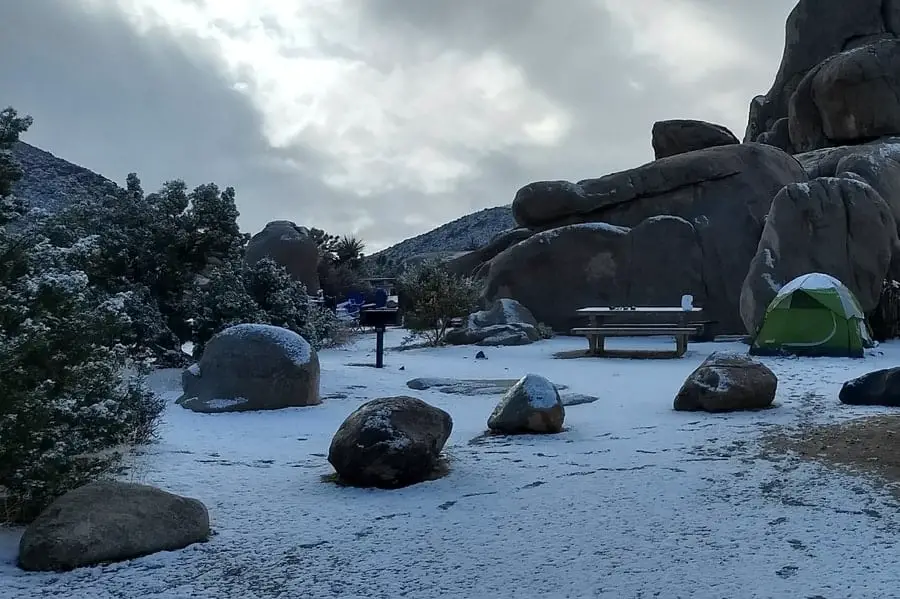
When I first started getting into camping outside of the summer months I wondered about how I was going to stay warm. The first thing I thought about was if my tent was insulated and if it would be enough. Then after realizing that the tent just didn’t do the job on its own, I knew that I needed to employ some other tactics to stay warm in my tent while camping.
Are tents insulated? Tents are poor insulators as their fabric is thin and they really aren’t designed to prevent heat loss. In order to stay warm in a tent, you must utilize other gear inside the tent. The tent’s main function is to protect you from the elements and reduce wind chill.
Focusing on trying to insulate your tent would not yield the best results. Instead what you want to do is insulate your body from the cold temperatures. Your body is what is generating heat and your job is to prevent that heat from being lost as much as needed. To do this is pretty simple and requires just some basic gear.
By the way, If you are in the market for a new tent, then you should click here to see the one I recommend on Amazon.
How well are tents insulated?
Tents are not very good insulators, but that’s okay because that is not what they are designed to do. Tents are designed to be portable temporary shelters that can protect you from the weather like wind, rain, and UV rays. For the most part, the internal temperature of a tent will closely reflect that of the outside ambient temperature. Maybe it will be a few degrees warmer if it is a small tent and you have the rain fly on. I wrote more extensively on how rain flys keep your tent a little bit warmer in this post.
Basically, rain flys might help keep the tent a little warmer since it can trap some of your body heat inside the tent temporarily. Tents are also good at holding onto some of the heat of the day, but eventually, that heat will dissipate as well since tents are designed to allow airflow to circulate moisture out of the tent. To be insulated, something must either prevent heat loss or the intrusion of sound. If you have ever been inside of a tent with noisy camping neighbors then you know that a tent is not good at insulating any sound.
Tents do not insulate us from the cold. Luckily for us, there are options to stay warm when tent camping. The main thing we must do is insulate ourselves. Our bodies are like little heaters and we want to make sure that we hold onto that heat ourselves instead of letting it get stolen from us. A tent does help in one way with this on its own. It reduces wind chill.
The wind chill is the reason why a windy day feels colder than a stagnant day. Air that is colder than your body passes through it and takes some heat with it. A tent does help reduce this from happening versus if you were laying out in the open.
Is there any way to insulate a tent?
You can certainly insulate a regular tent, although it’s not recommended for most campers. Why? Well because of moisture build-up. If you try to insulate your tent you will probably be impeding on its airflow designs. Tent’s need to have some airflow or else condensations will build up and get you and your gear wet which will only make things worse, and colder. An emergency situation might be the only reason to try and insulate your regular tent. For recreational camping, you should stick to the “how to actually stay warm in any tent” suggestions.
To insulate your tent you would simply need to drape an insulating material over it like a quilted blanket, an emergency blanket, or reflective foil. These materials would help insulate a tent, but again it’s not recommended due to condensation and moisture build-up that will occur. There are tents that are manufactured with the insulation built-in, which you will learn about next.
Are there tents that come already insulated?
Yes, there are, but these tents are usually much more expensive and often only needed for the most extreme cold camping temperatures. Most of these insulated tents need to be inflated and are made from polyester material. If you can afford it and want a little bit more luxury while camping in colder conditions then consider getting a pre-insulated tent.
They are very comfortable and are able to actually keep your tent cooler during the warm day and warmer during the cool night. These tents can also reduce some outside noise since that is one of the functions of insulation.
How to actually stay warm in any tent
If you want to stay warm while tent camping in colder conditions then the basics are going to get you through most of what you will experience. What you will need to stay warm is the following:
- Get the Smallest tent you can fit in
- A well-insulated sleeping pad
- A winter (or 3-season) sleeping bag
- Cold weather clothing
- Some smart tactics
Get the smallest tent you can fit in
The reason for this is that a smaller tent will have less space (duh) and therefore have less cold air space inside of it. Your body heat would keep better in a smaller tent than in a larger tent. This is probably one of the least important aspects of staying warm in a tent, but it is something to think about. This is more useful for backpacking. For car camping, I love having some room in my tent to move around in.
A well-insulated sleeping pad
Sleeping pads are usually drastically underestimated for their contribution in keeping you warm. These provide bottom insulation for you from the cold ground. Believe it or not, the cold ground will suck a lot of heat from you, even if you are in a sleeping bag. You need a good sleeping pad to stay warm and probably to sleep comfortably too. Unlike sleeping bags, you can get a sleeping pad with the highest R-value possible and it won’t cause you to overheat.
R-value is the resistance value to resist heat flow. A higher r-value means it will better reduce heat loss from under you when sleeping. Get the highest r-value sleeping pad you can reasonably afford because a higher r-value sleeping pad will not cause overheating.
A winter (or 3-season) sleeping bag
Your average summer sleeping bag is probably only rated for temperatures 30°F-40°F and up. For colder camping, you will need a 3 season or winter sleeping bag. 3 season sleeping bags are usually rated for temperatures between 15°F and 30°F. And winter sleeping bags are usually anything below 15°F. Fun fact the warmest sleeping bag in the world is rated for -60 I wrote about it in this article.
I recommend a 3 season sleeping bag to almost any serious camper because you can unzip them if it gets too warm and regulate your body heat that way, they allow for easy Spring and Fall camping. Alternatively, you can increase the warmth rating of the sleeping bag you already have by adding a sleeping bag liner. They also help keep the inside of your sleeping bag clean.
Cold weather clothing
Wearing the right clothing can make a world of a difference. Choosing the right type of fabrics is also something to consider. Cotton is usually not the best, and Wool is regarded as the most ideal. What you want out of cold weather clothing is that obviously, it keeps you warm, but also that it is moisture-wicking.
Long thermals, a ski mask or beanie, and good socks can go along way. Dress in layers so that you can always adjust the amount of clothing you are wearing so that you don’t sweat. Never wear wet or damp clothing to bed and you can increase your coldness tolerance a lot with good cold-weather clothing.
Some smart tactics
There is a plentitude of tips and tricks that you can also use to keep yourself warm. Some of them are better than others. Here are some of the best ones I think actually work to keep you warm:
- Empty the tank before bed
Urine requires heat from your body, so get rid of it before bed and keep the heat to yourself.
- Cuddle with a warm water bottle
Having a warm water bottle beside you in your sleeping bag can help you fall asleep warm.
- Do some sit-ups
Do some exercise inside of your sleeping bag to get some body-heat going.
- Eat some food
Calories are energy and energy generates warmth. Eat some food before bed to stay warm.
Related Questions:
How cold is too cold for tent camping?
The answer depends on your individual tolerance level. For the average camper without advanced camping gear, anything in the low 30s and below is probably going to be too uncomfortable. If you have winter gear than you can go lower of course but for basic summer camping gear try to stick to camping in temperatures between 50°F to 70°F for the best sleeping experience.
Is it warmer to sleep naked in your sleeping bag?
It is not warmer to sleep naked in your sleeping bag. You will be better off with dry warm clothing in colder temperatures. At the same time, you don’t want to make your body too hot to where you begin to sweat because that could cause you to cool down and not be able to get warm again because you will be damp.
I wrote in more detail on this subject in this post. Basically, the only way sleeping naked would keep you warmer is if your clothes were wet and you didn’t have anything dry to sleep in. In that case, it is better to sleep naked and dry instead of wet and clothed.
My Favorite Camping Gear
- Air Mattress: click here
 to check out my favorite on Amazon.
to check out my favorite on Amazon. - Tent: click here
 to see my favorite tent available on Amazon.
to see my favorite tent available on Amazon. - Sleeping Pad: click here
 to check out the one I love on Amazon.
to check out the one I love on Amazon. - Sleeping Bag: click here
 to see the one I recommend on Amazon.
to see the one I recommend on Amazon. - Camping Stove: click here
 to see the best camping stove on Amazon.
to see the best camping stove on Amazon.

